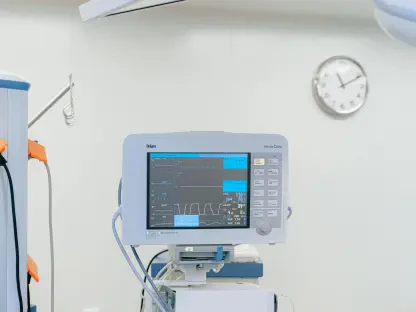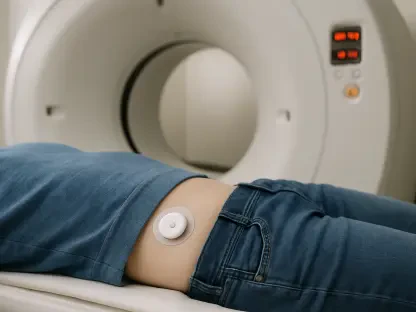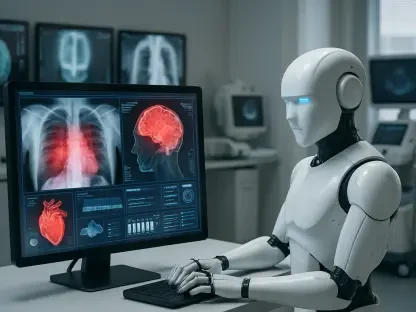Artificial Intelligence (AI) has woven itself into the fabric of modern healthcare, offering unprecedented advancements in diagnostics, treatment, and patient care. With the FDA authorizing close to 950 AI-integrated medical devices, the impact of AI on medicine is undeniable. However, as these sophisticated tools become more prevalent, the issue of performance degradation over time poses significant challenges. Enter ARPA-H’s new initiative aimed at resolving these precise issues.
AI-enabled medical tools are designed to evolve continuously, but variations in clinical environments, data acquisition protocols, and patient demographics can all contribute to a gradual decline in their effectiveness. Furthermore, there’s no current mandate for regularly scheduled testing and updates for these systems, leaving a critical gap that ARPA-H’s PRECISE-AI program aims to address.
The Rise of AI in Healthcare
Expanding Influence of AI Medical Devices
AI technology in healthcare is growing at an exponential rate. Its applications range from diagnostic imaging to personalized treatment plans and remote monitoring. With nearly 950 AI-based devices already in use, the technology promises to transform patient outcomes positively. Yet, as these tools become more integrated into clinical workflows, their performance sustainability becomes a pressing issue. Physicians and healthcare providers are increasingly relying on AI to assist with complex decision-making processes. However, the reliability of these AI models often degrades over time due to dynamic clinical environments. The issue of outdated AI models leads to inaccurate diagnostics and inefficient patient care, emphasizing the need for regular updates and maintenance.
The initial promise of AI in healthcare is undeniably enticing. AI’s ability to analyze vast amounts of data quickly and produce actionable insights gives clinicians a powerful ally in improving patient care. However, as these systems are exposed to the variable nature of healthcare settings—including fluctuating patient demographics, evolving clinical protocols, and differing methods of data acquisition—their performance can wane. Without a set of regulations ensuring periodic updates and recalibrations, these AI tools may fail to sustain their initial levels of accuracy and efficiency, making it imperative to develop strategies that keep them in optimal working condition.
Challenges of Maintaining AI Efficiency
One of the biggest challenges with AI in healthcare is the lack of standardized regulations requiring continuous performance monitoring and updates. Changes in patient demographics, data collection methods, and clinical practices can all influence the performance of AI algorithms, making their long-term reliability questionable. Physicians traditionally rely on their clinical intuition to identify when an AI model no longer performs optimally. This approach is fraught with inconsistencies and often results in lapses before issues are recognized. Incorrect diagnoses can occur before any degradation signs are evident, posing a risk to patient safety and care efficacy.
Clinical environments are inherently dynamic, and the variables that impact AI model performance are diverse and numerous. From shifts in patient demographics to advancements in medical imaging technology, the factors that can degrade AI performance are numerous, creating a complex landscape in which these systems must operate. As there are no standardized regulations that mandate regular monitoring and updating of AI models, the onus falls on healthcare providers to detect and rectify performance drops. This approach is inherently flawed, as human intuition is neither infallible nor consistent, leading to risks of misdiagnosis and suboptimal patient care.
Introducing the PRECISE-AI Program
Objective and Structure of PRECISE-AI
To tackle these pressing issues, the Advanced Research Projects Agency for Health (ARPA-H) has launched the Performance and Reliability Evaluation for Continuous Modifications and Useability of Artificial Intelligence (PRECISE-AI) program. The primary objective of this initiative is to develop intelligent systems that can continuously monitor AI models, detect performance issues early, and autonomously correct them. This targeted approach aims to fill the current regulatory void by introducing robust mechanisms for maintaining AI efficacy over time.
The PRECISE-AI program is methodologically structured into five technical areas. These include the development of tools for continuous performance monitoring, identifying degradation sources, and providing autonomous solutions for these issues. Participants will first focus on prototype development over two years, followed by two years of real-world testing to ensure their applicability and reliability. This phased approach is designed to ensure that the tools developed under the program are not only theoretically sound but also practically viable for real-world application. By taking a structured and phased approach, ARPA-H aims to address the multifaceted challenges posed by AI performance degradation in medical devices comprehensively.
Continuous Monitoring and Autonomous Correction
By emphasizing continuous monitoring, the PRECISE-AI program aims to ensure that AI models remain effective and efficient throughout their lifecycle. Advanced algorithms will be developed to detect any decline in performance promptly, precluding the need for human intervention to identify these issues. This would mark a significant shift from the current reliance on clinical intuition, offering a more reliable and consistent approach to maintaining AI tool performance. The ability to detect problems early and address them swiftly could mitigate many of the risks associated with outdated or underperforming AI systems.
Moreover, autonomously correcting performance degradation constitutes a pivotal aspect of the initiative. These self-correcting systems will minimize the burden on healthcare providers, allowing them to focus on patient care rather than software maintenance. This innovative approach intends to revolutionize the way AI-enabled medical tools are managed, ensuring they consistently deliver accurate results. By creating an environment where AI tools can adapt and improve autonomously, the PRECISE-AI program aims to maximize the benefits of AI in healthcare while minimizing the risks associated with performance degradation.
Impact on Clinical Practice
Reduced Burden on Healthcare Providers
One of the anticipated outcomes of the PRECISE-AI program is a significant reduction in the burden on healthcare providers. With AI systems capable of autonomously correcting themselves, clinicians can rely more confidently on these tools. This will enable physicians to devote more time to patient care and less to troubleshooting AI tools, fostering a more efficient healthcare environment. Healthcare providers often face the dual challenge of integrating new technology while maintaining optimal patient care standards. The autonomous features introduced by PRECISE-AI promise to streamline operations, reduce errors, and ultimately enhance the quality of care provided to patients.
The introduction of autonomous correction mechanisms through the PRECISE-AI program also has the potential to mitigate many of the challenges currently faced by clinicians. In a world where technology is ever-evolving, maintaining the efficacy and accuracy of AI tools without imposing additional burdens on healthcare providers is a critical need. The ability to trust in the reliability of AI systems will alleviate some of the stress associated with integrating these technologies into busy clinical workflows, allowing healthcare professionals to allocate their time and expertise more effectively.
Improved Patient Outcomes
The overarching goal of the PRECISE-AI program is to improve patient outcomes by ensuring the continuous reliability of AI-enabled medical devices. As these tools become more dependable, the accuracy of diagnostics and treatment plans will consequently improve. This initiative holds the potential to set new benchmarks for safety and efficacy in AI-driven healthcare solutions. Patients stand to benefit immensely from these advancements, experiencing higher levels of care quality and safety. The program’s emphasis on real-world testing further ensures that the developed solutions are practical and ready for immediate implementation in clinical settings, driving forward the standard of patient care.
With real-world testing as a cornerstone of the PRECISE-AI program, the transition from prototype to clinical implementation will be more seamless and reliable. This real-world testing phase will allow for the identification and resolution of any unforeseen issues, ensuring that the AI tools are not only theoretically robust but also practically effective. By focusing on practical applicability and real-world conditions, the program aims to develop solutions that are immediately valuable to clinicians and patients, enhancing the overall quality of care delivered in healthcare settings.
Long-Term Implications for Health Technology
Setting New Standards in AI Regulation
AI technology in healthcare is expanding rapidly, finding uses in areas like diagnostic imaging, personalized treatment plans, and remote patient monitoring. With nearly 950 AI-based devices currently in operation, these tools are set to significantly improve patient outcomes. However, as AI becomes more embedded in clinical workflows, ensuring its long-term performance presents a challenge. Healthcare professionals now depend more on AI for making complex decisions, but the effectiveness of these models often diminishes over time due to the constantly changing clinical environment. This degradation can lead to inaccurate diagnostics and poor patient care, highlighting the critical need for regular updates and maintenance.
The initial promise of AI in healthcare is compelling, offering the capability to quickly analyze large volumes of data and provide vital insights that enhance patient care. Yet, exposure to variable factors like shifting patient demographics, evolving healthcare protocols, and varying data collection methods can undermine AI’s reliability. Without regulations mandating periodic updates and recalibrations, these AI tools risk losing accuracy and efficiency. Therefore, developing strategies to maintain and improve these systems is absolutely essential for sustaining their effectiveness.









